BP Was Aware Of Problems At Deepwater Horizon Months Before Explosion
There’s a fairly disturbing report in today’s New York Times indicating that British Petroleum was aware of safety problems at the Deepwater Horizon oil rig months before the April 20th explosion that destroyed it:
WASHINGTON — Internal documents from BP show that there were serious problems and safety concerns with the Deepwater Horizon rig far earlier than those the company described to Congress last week.
The problems involved the well casing and the blowout preventer, which are considered critical pieces in the chain of events that led to the disaster on the rig.
The documents show that in March, after several weeks of problems on the rig, BP was struggling with a loss of “well control.” And as far back as 11 months ago, it was concerned about the well casing and the blowout preventer.
On June 22, for example, BP engineers expressed concerns that the metal casing the company wanted to use might collapse under high pressure.
“This would certainly be a worst-case scenario,” Mark E. Hafle, a senior drilling engineer at BP, warned in an internal report. “However, I have seen it happen so know it can occur.”
Of course, there’s a good case to be made that being prepared for the worst case scenario is probably a good idea, especially when you’re dealing with the possibility of a catastrophic disaster.
The most disturbing revelations, though, involve the blowout preventer, the one piece of equipment that was supposed to stop a disaster like this from happening in the first place:
The documents show that in March, after problems on the rig that included drilling mud falling into the formation, sudden gas releases known as “kicks” and a pipe falling into the well, BP officials informed federal regulators that they were struggling with a loss of “well control.”
On at least three occasions, BP records indicate, the blowout preventer was leaking fluid, which the manufacturer of the device has said limits its ability to operate properly.
“The most important thing at a time like this is to stop everything and get the operation under control,” said Greg McCormack, director of the Petroleum Extension Service at the University of Texas, Austin, offering his assessment about the documents.
He added that he was surprised that regulators and company officials did not commence a review of whether drilling should continue after the well was brought under control.
After informing regulators of their struggles, company officials asked for permission to delay their federally mandated test of the blowout preventer, which is supposed to occur every two weeks, until the problems were resolved, BP documents say.
At first, the minerals agency declined.
“Sorry, we cannot grant a departure on the B.O.P. test further than when you get the well under control,” wrote Frank Patton, a minerals agency official. But BP officials pressed harder, citing “major concerns” about doing the test the next day. And by 10:58 p.m., David Trocquet, another M.M.S. official, acquiesced.
“After further consideration,” Mr. Trocquet wrote, “an extension is approved to delay the B.O.P. test until the lower cement plug is set.”
When the blowout preventer was eventually tested again, it was tested at a lower pressure — 6,500 pounds per square inch — than the 10,000-pounds-per-square-inch tests used on the device before the delay. It tested at this lower pressure until the explosion.
Some of these revelations were also covered in a 60 Minutes piece two weeks ago (Part One and Part Two) when they interviewed Mike Williams, one of the only survivors from the Deepwater Horizon, who revealed that there had been problems with the blowout preventer weeks before the explosion and that BP officials on the rig had chosen to proceed ahead with drilling rather than investigating what could have been a potentially huge safety problem.
Things are not looking very good for BP right now.
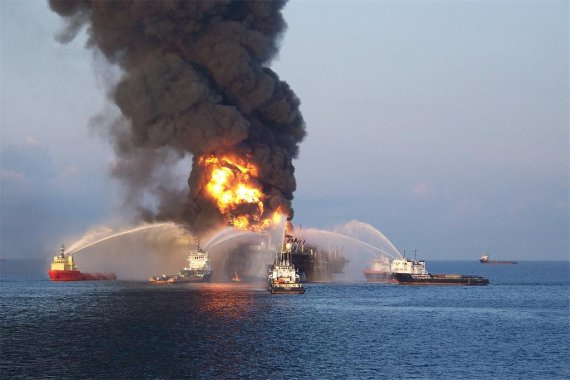

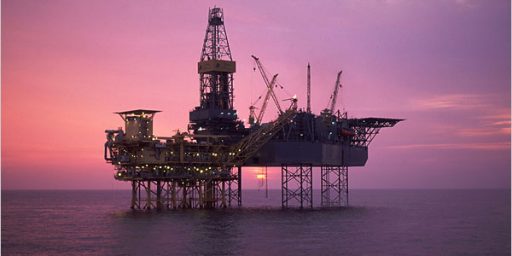
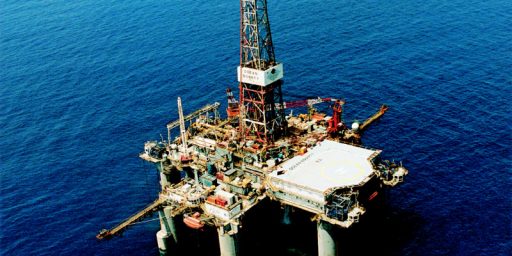
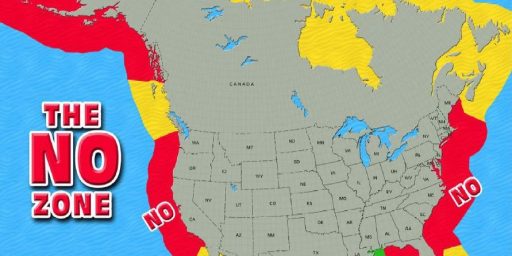
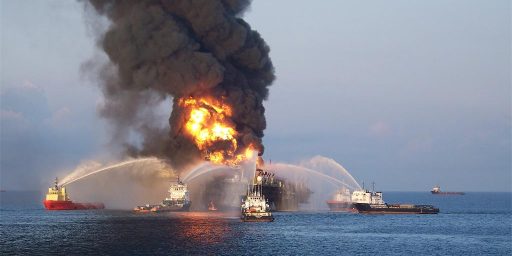

Ever since reading Taleb I’ve been looking for Black Swans. In the first week I asked myself, what if they can’t stop it? It seemed to be outside the discussion, the question no one asked.
(There have been unstoppable leaks on dry land.)
The first priority is stopping the spill. After that the priority should be cleaning up. We’ll have lots of time to investigate and prosecute any wrongdoing. I believe we should prosecute any wrongdoing to the full extent of the law. However, right now do investigations, prosecutions, and threat of same make the first priorities more or less likely?
While I think that it would prudent to be thinking about what we might do if the spill proved to be unstoppable, I also think it’s premature to pronounce it so now. In a sense the containment approach apparently being retried now is an acknowledgement of unstoppability. Or at least that containment may be more cost-effective than stopping it.
I think it bears mentioning that I continue to believe that this is a political loser for the administration whatever happens. Right now I think they should be treading the narrow, difficult line between being seen as not being involved and being identified with the problem. The more appearances, speeches, etc. that President Obama makes on the subject the more he’s likely to be identified with it. Since any cleanup will take years that’s probably not a good thing.
One more thing that bears mentioning. I received notice the other day of a special dividend declared by BP. I find that troubling, especially in the light of the similar special dividend declared by Transocean, the outfit that owns the oil rig, some time ago. It smacks of looting.
We obviously have to proceed as if it were stoppable, and with the idea that we will do whatever it takes. I say that in part because I don’t believe containment works or that dispersants help us on this scale of leak, long term.
The longer this goes the more environmental harm we’ll just have to suffer.
Which is why the investigation needs to be in progress now.
BTW, Dave, is your site having problems? I can’t raise it.
The US Gov has every right to seize assets from BP in order to pay for cleanup of this mess. If it takes every penny they got, then so be it.
I’m having a wrestling match with my web host right now. It can’t be resolved over the Memorial Day Weekend. If I don’t get things resolved within the next few days thereafter I’ll need to change hosts which I don’t particularly relish.
There is such a thing as the rule of law. The federal government has placed limitations on BP’s liability.
Dave’s right, if Congress tried to repeal the liability cap retroactively it would clearly be unconstitutional
Weird line of the day:
Have done? Apologies if you’ve discussed this, but the idea that Russians have nuked oil wells is news to me.
Aren’t there provisions on the liability cap?
I thought that negligence cleared the liability cap and this latest revelation seems to open the door for claims or negligence.
On that liability cap:
” />
Sam,
That’s for the information.
Personally, I don’t believe that there should be any liability cap. If a person or a corporation causes damage through their negligence they should be responsible for the consequences
John,
There were reports about this when the crisis first started which I wrote about a few weeks ago.
Apparently, the Russians used low-yield nuclear weapons to stop oil spills and for other non military purposes several times in the 1960s.
And why should they care if they discover that there are problems in an offshore platform? In the end, they pay a fine which is ridiculous compared to their profits and continue business-as-usual. These disasters are part of the game oil companies are playing.
In the end, we have to ditch oil dependence. Starting with offshore drilling and tar sands, of course.